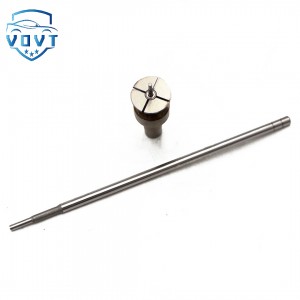High Precision New Diesel Injector Control Valve F00VC01517 Valve Assembly for Fuel Injector Engine Spare Parts
Products Description
| Reference Codes | F00VC01517 |
| Application | / |
| MOQ | 6 PCS |
| Certification | ISO9001 |
| Place of Origin | China |
| Packaging | Neutral packing |
| Quality Control | 100% tested before shipment |
| Lead time | 7~10 working days |
| Payment | T/T, L/C, Paypal, Western Union, MoneyGram or as your requirement |
Analysis of the Influence of Valve Assembly Structural Parameters on Dynamic Response Characteristics
Abstract
Valve assemblies are fundamental components in high-pressure fuel injection systems, directly affecting injection timing, pressure stability, and fuel delivery accuracy. Their dynamic response characteristics are strongly influenced by structural parameters such as spring stiffness, valve seat angle, mass of moving parts, and clearance design. This paper investigates the effects of these parameters on dynamic response using computational modeling and experimental validation, aiming to provide a design guideline for optimized valve assemblies.
1. Introduction
Modern diesel engines require precise injection control to meet stringent fuel efficiency and emission standards. The valve assembly regulates fuel flow during injection and recovery phases, and its response speed determines the accuracy of injection events. However, inappropriate structural parameter design often leads to delayed response, oscillation, or excessive wear. Therefore, understanding parameter sensitivity is essential for achieving stable and reliable dynamic performance.
2. Methodology
-
Modeling approach: A coupled fluid–structure interaction (FSI) model was developed to simulate the valve’s motion under transient injection conditions.
-
Parameters investigated: spring stiffness, valve seat cone angle, moving mass, and clearance tolerances.
-
Experimental setup: A high-pressure injector test bench equipped with displacement sensors and high-speed data acquisition was used to measure opening delay, closing delay, and oscillation behavior.
3. Results
-
Spring stiffness: Increasing stiffness improved closing speed and reduced residual oscillation but increased opening delay due to higher required actuation force.
-
Valve seat angle: Smaller cone angles enhanced sealing but generated higher flow resistance, causing longer pressure recovery times. Moderate angles achieved a balance between sealing and flow efficiency.
-
Mass of moving parts: Higher mass increased inertial delay and oscillatory motion, while lightweight designs significantly improved dynamic response but required careful durability consideration.
-
Clearance design: Excessive clearance led to leakage and unstable dynamics, while overly tight fits caused friction and wear. Optimized clearances minimized leakage while ensuring smooth motion.
4. Discussion
The study shows that dynamic response characteristics result from complex interactions between multiple parameters. While stiffer springs and lightweight designs enhance responsiveness, they must be balanced with durability requirements. Similarly, valve seat angle optimization is essential for achieving both sealing reliability and hydraulic stability. CFD-FSI simulations combined with experimental validation proved effective in capturing these trade-offs.
5. Conclusion
Structural parameters of valve assemblies have a significant impact on dynamic response. Optimal performance can be achieved by employing moderate spring stiffness, lightweight moving components, balanced valve seat geometry, and carefully designed clearances. These insights provide practical guidance for designing next-generation valve assemblies that meet the demands of high-efficiency, low-emission diesel engines.



























